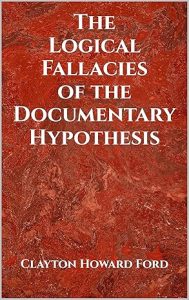There are two verses in Exodus that seem to contradict what is said in Genesis and both of them center on the name of God. The first verse is Exod. 6:3. As it is usually translated, that verse states: “’I appeared to Abraham, to Isaac, and to Jacob as El Shaddai, but by my name Yahweh I was not known to them.’” The latter half of the verse conflicts with the book of Genesis, which clearly testifies that Abraham, Isaac and Jacob did know that God’s name was Yahweh.
The problem is the translation. The latter half of verse 3 should be translated as a rhetorical question, making the whole verse read as follows: “’I allowed myself to appear to Abraham, to Isaac, and to Jacob as El Shaddai, for did I not let myself be known to them by my name Yahweh?’” The answer, of course, is yes, he did let himself be known to them by his name Yahweh. The verse now agrees with Genesis rather than contradicting it.
An objection to this translation may be that in Hebrew a question usually begins with an interrogative pronoun or adverb (such as “who” or “where;” Hebrew does not use question marks). The latter half of verse 3 has neither, which is why most scholars fall into translating the verse in the usual manner. But in the standard textbook on Hebrew grammar, Dr. Wilhelm Gesenius, a highly respected scholar, has stated:
A question need not necessarily be introduced by a special interrogative pronoun or adverb…. So especially, when the interrogative clause is connected with a preceding sentence by וְ [a particle which is translated as and, but, or for, depending on context]…or when (as in some of the examples just given) it is negative….
One of his examples is Jonah 4:11. This verse is connected with the preceding sentence by the particle, it is negative and it is missing an interrogative pronoun. It could be translated, “’And I should not have compassion on Nineveh, the great city,’” but this translation conflicts with the context. God was obviously explaining to Jonah why he, God, should have compassion on Nineveh. This verse, therefore, must be translated as, “And should I not have compassion on Nineveh, the great city?’” Translating verse 11 as a rhetorical question and not as a negative statement makes sense because the question better fits the context.
The latter half of Exod. 6:3 is also connected with the preceding sentence by the particle, it is also negative and it is also missing an interrogative pronoun or adverb. Translating it as a rhetorical question and not as a negative statement makes sense because the question better fits the context and eliminates the contradiction.
Translating it as a rhetorical question and not as a negative statement also shifts the meaning of the sentence from denying the knowledge of God’s name in previous generations to emphasizing the importance of this name above that of his other name, El Shaddai. This emphasis is indicated in Genesis: Yahweh is used frequently, El Shaddai rarely. But, given the context of verse 3, why would God want to emphasize this name above the other? To answer that, we need to turn to the other problem text.








